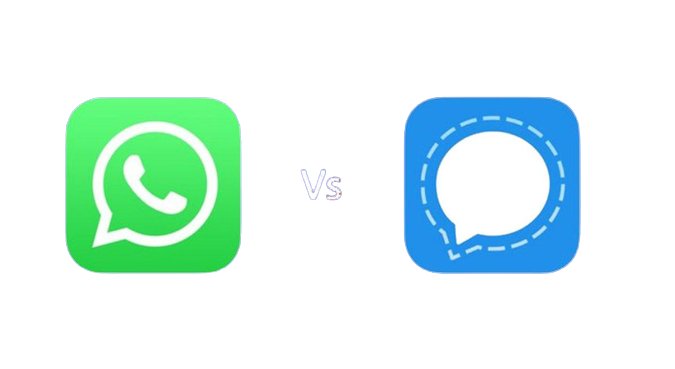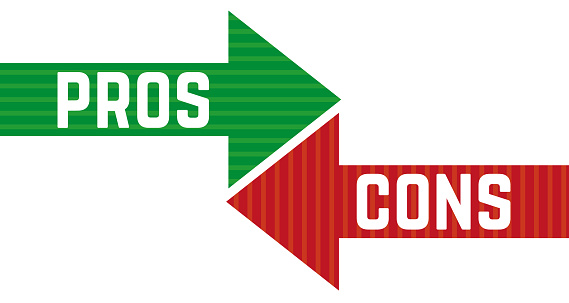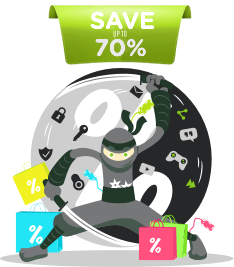 In a world where privacy and security are of utmost concern, messaging apps have become an integral part of our lives. Two popular contenders in the market – WhatsApp vs Signal – have been vying for the top spot.
In a world where privacy and security are of utmost concern, messaging apps have become an integral part of our lives. Two popular contenders in the market – WhatsApp vs Signal – have been vying for the top spot.
While WhatsApp has been around for over a decade now, Signal has emerged as a new player with promises of being more secure than its counterparts.
As we have stepped into 2023, it's time to compare these two giants and determine which one is better suited to meet your communication needs. So, are you ready to find out who takes the cake? Let's dive right in!
What is WhatsApp?

WhatsApp is a messaging app with over 2 billion users worldwide. It's available for iPhone, Android, and Windows phones. WhatsApp offers end-to-end encryption, meaning your messages are private and can only be read by the people you're chatting with.
One of the key features of WhatsApp is its simplicity. The app is easy to use and allows users to send text messages, voice messages, photos, and videos to their contacts. WhatsApp also supports group messaging, allowing users to create groups with up to 256 members.
WhatsApp uses end-to-end encryption, which means that only the intended recipient can read the messages sent. This ensures that messages are secure and private, and cannot be intercepted by third parties. In addition, WhatsApp does not store messages on its servers once they have been delivered, further enhancing user privacy.
WhatsApp also supports voice and video calls, making it a popular choice for people who need to have conversations with friends and family across the globe. WhatsApp calls use the internet instead of traditional phone lines, which means that users can make calls for free or at a low cost, depending on their internet plan.
What is Signal?

Signal is a messaging app that provides end-to-end encryption for secure communication. It was created by the non-profit organization Signal Foundation and has gained popularity due to its security features and commitment to user privacy.
One of the key features of Signal is its end-to-end encryption, which ensures that only the intended recipient can read the messages sent. This means that even the Signal servers cannot access the contents of the messages. Signal also encrypts voice and video calls, making it a popular choice for people who need to have confidential conversations.
Signal also offers additional security features, such as the ability to set disappearing messages that automatically delete after a specified time. This is particularly useful for sensitive conversations that should not be saved for long periods of time.
In addition to its security features, Signal has a user-friendly interface that makes it easy to use. The app allows users to send text messages, voice messages, photos, and videos, as well as make voice and video calls. Group messaging is also available, and users can create groups with up to 1000 members.
The Pros and Cons of WhatsApp and Signal
 When it comes to messaging apps, there are a lot of options to choose from. But two of the most popular ones are WhatsApp and Signal. Both have their own pros and cons, so it can be tough to decide which one to use. Let's take a look at the pros and cons of both WhatsApp and Signal to help you decide which one is right for you.
When it comes to messaging apps, there are a lot of options to choose from. But two of the most popular ones are WhatsApp and Signal. Both have their own pros and cons, so it can be tough to decide which one to use. Let's take a look at the pros and cons of both WhatsApp and Signal to help you decide which one is right for you.
WhatsApp Pros:
-WhatsApp is a very popular messaging app with over 1 billion active users.
-It's available on all major platforms, including iOS, Android, Windows Phone, and more.
-WhatsApp offers end-to-end encryption for all messages sent through the app.
-You can make voice and video calls with WhatsApp.
WhatsApp Cons:
-WhatsApp is owned by Facebook, which has been embroiled in data privacy scandals in recent years.
-There have also been concerns about WhatsApp's security vulnerabilities in the past.
-WhatsApp lacks some features that are available on other messaging apps, such as stickers and group chat support.
Signal Pros:
-Signal is a highly secure messaging app that offers end-to-end encryption for all messages.
-It's open source, so security experts can audit the code for any potential vulnerabilities.
-Signal offers more features than WhatsApp, such as group chat support and stickers.
Signal Cons:
-WhatsApp requires users to have a phone number, while Signal does not. This can be a problem for people who want to keep their identity private or who do not have access to a phone number.
-WhatsApp messages are not encrypted by default, meaning that they could potentially be read by anyone with access to the app.
WhatsApp vs Signal. Which One Should You Use?
There are a lot of messaging apps out there, but which one should you use? WhatsApp vs Signal are two of the most popular options, but which one is better?
Both WhatsApp and Signal offer end-to-end encryption, meaning that your messages are private and secure. However, there are some differences between the two apps.
WhatsApp is owned by Facebook, while Signal is independent. This means that Signal is not subject to the same data collection practices as WhatsApp.
Signal also offers more features than WhatsApp, such as the ability to make video calls and share files. However, WhatsApp is more widely used, so you're more likely to be able to find your friends on it.
So, which one should you use? It depends on what you're looking for when considering WhatsApp vs Signal.
If privacy is your main concern, then Signal is the better option. However, if you want to be able to chat with as many people as possible, then WhatsApp is probably a better choice.
Use VPN for instant messages
Using a VPN (Virtual Private Network) for WhatsApp or Signal can offer several benefits, including enhanced security and privacy.
One of the main benefits of using a VPN with WhatsApp or Signal is that it can help to encrypt your internet traffic and hide your online activity from prying eyes. When you use a VPN, your internet traffic is routed through an encrypted tunnel, which means that your activity cannot be monitored or intercepted by hackers, governments, or other third parties.
This is particularly important if you are using public Wi-Fi networks, which are often insecure and can leave you vulnerable to cyber-attacks.
Another benefit of using a VPN for WhatsApp or Signal is that it can help to bypass censorship and geo-restrictions. Some countries or regions may block access to these messaging apps, or may limit their functionality in some way. By using a VPN, you can connect to a server in a different country and access these apps as if you were located there.
In addition, using a VPN can help to protect your identity and location from being tracked by advertisers or other third parties. VPNs can also help to prevent your internet service provider (ISP) from tracking your activity and selling your data to advertisers.
Overall, using a VPN for WhatsApp or Signal can help to enhance your privacy and security while using these messaging apps. However, it's important to choose a reputable VPN provider and follow best practices for using VPNs, such as keeping your VPN software up-to-date and avoiding free VPN services that may compromise your security.
Best VPN for instant messages
HideIPVPN offers a VPN service with military-grade encryption, and high-speed servers with unlimited bandwidth.
Our service comes with shared IP addresses so that your activity can never be tied to one particular user, further protecting your privacy.

We also offer DNS leak protection, a Kill Switch, the latest VPN protocols, and a guaranteed no-log policy.
Best VPN Deal! Get HideIPVPN for $2.7/mo!
Every purchase you make comes with a 30-day money-back guarantee.
Conclusion
In 2023, WhatsApp and Signal will both be significant players in the messaging market.
At the end of the day, it all comes down to personal preference when choosing which service is best for you.
If privacy and security are your top priority, then Signal might be the better option. However, if you need a platform that can do more than just plain text messaging, such as video calls and group chats, then WhatsApp could be more suitable for your needs.
Whichever one you choose to use though - WhatsApp vs Signal, rest assured that both services provide a reliable way to connect with friends and family online.



